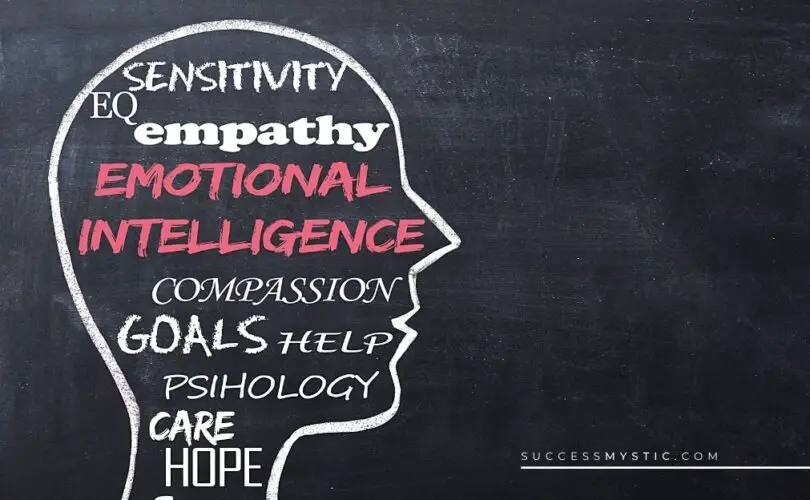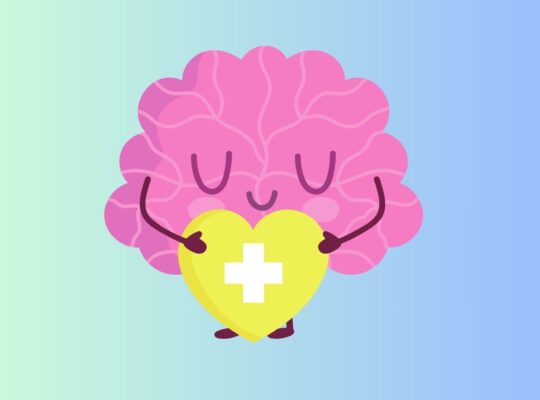What Is Emotional Intelligence
Quite simply, it is the ability to understand your own emotions and feelings, as well as those of others. Your understanding of emotions allows you to analyze information and guide your actions and your thinking. To put it even simpler, your emotional intelligence is a collection of skills around your emotional and mental health. While some people may be more equipped with emotional intelligence, it is a skill that you can acquire.
A lot of people get caught up in their intelligence quotient, without ever considering their emotional intelligence level. It’s your EQ, though, that helps you read the feelings of yourself and others. It’s how you learn to express those emotions, as well as regulate them. Additionally, your EI helps you deal with the emotions of others. You would probably like to think you tick both intelligence boxes.
You know your emotions and you can label them, right? That doesn’t mean you have your EI down pat, though. In fact, most of us have been overestimating our abilities. Emotional intelligence is vital in predicting success (both professional and personal), health, and happiness. We would all benefit from investing more time in training our emotional intelligence.
The term emotional intelligence was first used by Jack Mayer and Peter Salovey. Salovey was Yale University’s president while Mayer was a professor at the University of New Hampshire. They created the term and the EI theory itself. ref.
What their work demonstrated, was how emotions could impact the behavior and thought process of an individual. That was in 1990. Since then, experts in the field have continued to build on that theory in a bid to refine what really lies at the core of EI.
It isn’t just about knowing what emotions that you are experiencing. It’s about using those emotions to inform your thought process and in turn, using your thought process to inform those emotions.
It is all about having a keen awareness of how your behaviors and decisions are driven by your emotions.
Emotionally intelligent leaders are more empathetic. They have the ability to see situations from other points of view. They tend to be more open-minded, they can tackle challenges, all while overcoming obstacles to pursue their ultimate goals.
While some people may define EI as a soft skill, it’s far more than that. It’s a deep understanding of what is going on within you, to allow you to consciously decide how to use those feelings.
How do you want to manage yourself? Moreover, how do you want the world to view you?
Emotional Intelligence Matters
It was just a few years ago that China’s President Xi gave a college commencement speech to a large group of graduates. What he told them that day was that their emotional intelligence would be a greater predictor of their success than their IQ. That doesn’t mean that IQ doesn’t matter at all. However, a high IQ can’t predict success. [ref.]
It doesn’t mean that you would be successful in a leadership position. Nor does it mean that you will excel in any job that you do. Just think about your work experience thus far.
You have probably worked alongside some incredibly intelligent people, but did that make them better than you at your job? Were they as effective in sales or management than people with a high emotional intelligence level? It’s possible that you have watched someone leave (or be let go from) a job that they could handle technically speaking.
Yet, they struggled with the emotional side of things. That doesn’t mean low EI people will be unsuccessful. You can still succeed if you lack emotional intelligence. However, your emotional intelligence will dictate how well you collaborate with others, as well as how effective you are at influencing and engaging your co-workers and/or subordinates.
Therefore, you shouldn’t underestimate just how important a role your emotional health will play in your professional (and personal) life.
We have discussed the professional side of things, but emotional intelligence can impact your personal life just as much.
Just imagine how much more successful your relationships would be if you were capable of putting yourself in the other person’s shoes.
Moreover, how different would your relationships look if you could show more empathy to those around you?
Consider your emotional health, which is at the center of high emotional intelligence.
The Pillars Of Emotional Intelligence
There are five pillars associated with emotional intelligence.
- Self-Awareness – a major part of being comfortable in your own skin is having a healthy self-awareness. Which means that you have an understanding of how you impact others, your emotions, as well as your strengths and weaknesses. Perhaps the greatest sign of a strong sense of self-awareness is how you respond to constructive criticism.
- People Skills – people with a high emotional intelligence are more respected by others, whether it’s their employees, bosses, co-workers or friends. They understand what it is that makes other people tick. Which means they are exceptional at building trust and rapport with other people. They don’t engage in power struggles or character assassination. It’s just not their style.
- Motivation – a leader with emotional intelligence is intrinsically motivated. They understand why they want to achieve certain goals and it doesn’t tend to be related to job titles or salary. They’re more optimistic in the face of disappointment and resilient when facing a challenge or outright failure. They have an almost unbreakable confidence.
- Self-Regulation – self-regulation and EI go hand in hand. It’s an ability to demonstrate restraint and maturity when sharing your emotions. Instead of hiding their feelings, they have an ability to express those emotions with control and respect.
- Empathy – empathy goes a long way, especially in the workplace. That doesn’t mean empathetic people go easy on others. What it does mean, however, is that they have a deeper understanding of human nature, which means they find it easier to connect with others on an emotional level. They are compassionate. This means they find it easier to deal with frustration and concern.
Emotional Intelligence Training
While there are plenty of ways you can improve your emotional intelligence, we want to get you started with just three simple steps.
- Attention – it should come as no surprise to you that the foundation of emotional intelligence is attention. It’s all about holding the ability to clear your mind, whilst also calming it.
- Self-Mastery – once you have your attention trained, you can master your sense of self. You should be able to observe your stream of thought, while also being able to clearly process your emotions from an outsider’s perspective. Once you have mastered this ability, you will open up a level of self-knowledge that you haven’t experienced before.
- Mental Habits – creating healthy mental health habits is vital to improving your emotional intelligence. You can exercise habits like compassion and kindness. These are things that you often extend to others, but don’t extend to yourself. While it’s also important that you hold positive wishes and wants for other people, you should be training your mental habits to do the same for yourself.
50 Major Payoffs Of Developing Emotional Intelligence
It’s time to take a deep dive into the major payoffs associated with developing a strong sense of your emotional health and boosting your emotional intelligence.
- Performance – having a high level of emotional intelligence can help you successfully navigate the workplace on a social level. Additionally, it can assist you in motivating, as well as leading, others. Which means that EI can truly improve your overall performance. In fact, when it comes to large companies, many will try to determine your level of EI in the interview stages. Some of them go so far as to test you.
- Success – it makes sense that, since EI can help improve your performance, that it can lead you to be more successful. While we talk a lot about EI in the professional sense, it can also have a major impact on the success of your personal life.
- Physical Health – if you can’t manage your emotions, then there’s a good chance you struggle with stress management as well. This can result in serious implications for your physical health. Unmanaged stress can increase blood pressure, affect your immune system, and increase the risk factors for stroke, heart attacks, and even infertility.
- Mental Health – likewise, unchecked emotions can influence your mental health. Which leaves you more vulnerable to mental health issues like depression and anxiety. How can you form healthy, strong relationships if you don’t understand your own emotions? Beyond that, if you aren’t comfortable with those emotions or able to manage them… it will affect your ability to form healthy relationships.
- Social Intelligence – you might not realize it but being in touch with emotions can improve your social world. It’s easier to connect with others and understand them when you have a high level of emotional intelligence. You can recognize your friends, measure how interested people are in you, all of which reduces the typical stresses that surround social interactions.
- Social Awareness – we already touched on social intelligence, but social awareness isn’t quite the same thing. Social awareness is all about the nonverbal cues people often miss. It’s the nonverbal cues that give you a clue as to what others really feel, what’s important, and how their emotions are changing. When in a group situation, people send out a variety of nonverbal cues. Emotional intelligence helps you read these and understand the dynamics of a group.
- Strong Relationships – have you ever tried to sit down and have a serious conversation only for it to descend into anger and madness? Being able to understand your emotions helps you to control them, which allows you to adequately express and communicate how you feel. It also allows you to understand how others feel. It’s all about effective communication, which leads to stronger personal relationships.
- Relationship Management – in our early years, there is a heavy emphasis on working well with others. That never really goes away, the wording that we use simply changes. Being able to work with others is a process that is built on emotional intelligence. Your relationships will be more fulfilling and fruitful when you have the emotional intelligence to relate to others.
- Emotional Awareness – learning how to manage your stress is a vital part of getting in touch with your emotions. It’s difficult to be aware of your emotions when stress is dictating how you experience your feelings, and how you respond to them. So, of course, emotional intelligence is going to lead to greater emotional awareness.
- Teamwork – employers value teamwork, it’s an extension of that working well with others box that got ticked on your report card in school. The ability to clearly communicate is a commodity and those with high levels of emotional intelligence are more adept at doing so. It plays strongly into the teamwork skill because they aren’t just able to share their own ideas. They are equally as open to hearing the ideas of others. Which means they aren’t concerned about running the show but understand when to take a step back and let others have their say. That’s all to say, it makes you a more attractive candidate to employ (or promote). It also makes your home life better.
- Improved Environment – a high level of emotional intelligence is one incredible way to improve your environment. In the workplace, EI helps boost morale (yours and that of everyone else). When you are better at relating to others, you respect people more. Which makes the workplace (home and anywhere else) a much better place to be. It will improve your actual work and the experience that you get from working with the people around you.
- Flexibility – change can be upsetting, which is why flexibility is so important. When you are geared to improve yourself, it’s only natural that you will strive to improve everything else around you. Which means that you are incredibly flexible to change. Since change is one of the most stressful experiences that people go through, the ability to adapt is an excellent benefit of strong EI.
- Improved Self-Awareness – in most interview situations you will be asked to name your strengths and weaknesses. There is nothing worse than interviewing someone who easily lists off a number of strengths and claims to not have a single weakness. It’s indicative of someone who has no self-awareness. Weaknesses are only true weaknesses if you aren’t aware of them. So, the ability to identify your weaknesses shows a self-awareness that employers are desperate to find. That is part and parcel of emotional health. It also shows that you are capable of accepting feedback and indicates that you will use it to grow.
- Self-Control – emotional intelligence and the ability to handle difficult situations go hand in hand. There will always be situations that make us feel uncomfortable, especially if you are in a leadership position. It may be that you’re dealing with an angry employee, a disappointed boss or even a client who is unhappy with the service they have received. Of course, you could also be trying to deal with the terrible twos. No matter what challenging situation you face, a high level of emotional intelligence will help you remain calm. You might be raging inside, but your exterior appears controlled. We all deal with embarrassing, difficult, and uncomfortable conversations. Some people act out in these moments. They are prone to emotional outbursts and can’t control their feelings. Someone with a high emotional intelligence can handle their own emotions, as well as the other emotions at play.
- Compassion – if you look around at all the people you know, you will find it easy to identify those in your life with low emotional intelligence. They are the people who struggle to show compassion to others, whether it’s the people they know or strangers. It’s your compassion that helps you connect with people on an emotional level. This is beneficial at home and in the workplace, especially if you work with clients who are dealing with difficult circumstances. The ability to show compassion for others is important.
- Time Management – this is particularly helpful in the workplace as employers tend to expect work to be completed on time. A lack of time management causes frustration for everyone involved, it can also affect your job security. For those in a leadership position, people with emotional intelligence avoid micromanagement. This means that they recruit people who also display emotional intelligence and then empower them to do the job they were hired to do. This allows everyone in the business to focus on their tasks, which ensures that everything gets done on time.
- Optimistic – a high emotional intelligence makes people more optimistic. Optimists don’t let anything stand in their way, and they make everyone around them perk up, too.
- Motivated – people who are more optimistic are more motivated. It really doesn’t matter whether that goal is personal or professional, they have that growth mindset that is necessary to overcome any obstacle that stands in their way. It’s just another challenge that they can solve.
- The ability to successfully manage even the most difficult of situations.
- An ability to be open and honest with their ideas and opinions. However, they are also just as open to listening to the opinions and ideas of others.
- They don’t demand respect from others, their behavior simply commands it.
- They have the ability to handle any meeting, while also leading others.
- As a result of the respect they command naturally, they have a keen ability to influence those around them.
- They aren’t afraid to ask others for help, whether it’s a colleague, employee or employer.
- The ability to work calmly at all times, even in the most stressful of situations.
- They have the motivation to complete any task but are also effective at motivating others to do the same.
- They have the ability to remain positive in any situation.
- Leadership Skills – recruitment is expensive, so when employees look to hire new people they want a long-term solution. They look for people who show they have room to grow. You might be starting in a smaller position, but they want to know you’re loyal and will work your way up the ladder. People with high levels of emotional intelligence display these leadership skills immediately. Strong leadership results in employees feeling valued and respected, which leads us to the next two points.
- Productivity – in terms of business, many of the skills above feed into two big business boosters. One of those is productivity. Productive employees make for a better workplace
- Profitability – it should come as no surprise that the second booster is profitability. It’s a natural result from increased productivity and strong and effective leadership. Emotional intelligence is a benefit to any type of business, whether it’s a large corporation or a small business that is just starting out. Of course, for the latter, emotional intelligence could be the key to unlocking success.
- A Step Ahead – if you are a business owner, then you can get a step ahead of the competition by hiring people who high emotional intelligence. At this point, it’s a growing trend, but it hasn’t taken off everywhere. Which means you can aim to hire emotionally intelligent people who are naturals. Just imagine building a team of people who can relate to others, show compassion, and display empathy.
- Self-Care – you’re probably used to showing kindness to others, but do you extend the same compassion to yourself? People with high emotional intelligence understand the importance of self-care and practicing positive thoughts and affirmations.
- Calmness – you’ve probably heard the term self-soothing in relation to babies. Well, emotional intelligence provides you with your own style of self-soothing. It’s the ability to calm your mind and body down in stressful situations. You can take a step back and objectively look at a problem by removing yourself from the issue.
- Clear Mind – one of the benefits of the calmness that comes from emotional intelligence is a clear mind. It’s that clear mind that helps you make sound decisions.
- Improved Sales – if you happen to be in a sales driven business, your emotional intelligence may have a lot to do with how successful you are. It’s easier to sell to people when you have a basic understanding of who they are and what they need. Of course, sales can be a stressful business, and being able to manage your stress is helpful. No one appreciates a desperate salesperson who pushes them too far.
- Employee Satisfaction – you can use emotional intelligence assessments to properly structure your business. This will ensure that every employee is in the role most suited to them and improve your procedures and processes.
- Risk Management – two separate studies have indicated the risk of employing low emotional intelligence people. In one study, it’s found that low EI employees are more likely to have accidents at work. [ref.] In the other, there is a strong correlation between workplace theft and a low emotional intelligence [ref.]. So, it will benefit your shrinkage numbers and your accident record to invest in people with a high emotional intelligence.
- A Vision – unfortunately, we spend most of our waking hours in the workplace. For some people, this means experiencing negative emotions along with the positive ones. This is where your emotional intelligence can come into play. You can use your EI to display consistent behavior which helps you manage those negative emotions and learn how to harness those positive ones for the greater good. This ability allows you to share your vision with others and get their buy-in, too.
- Active Listening Skills – there is no better way to effectively communicate than by actively listening. There’s a lot more to it than paying attention to what people say. You need to be following the conversation genuinely, responding with your body language, and then demonstrate that you have it right. Which simply means repeating their key points back to them. It doesn’t just let them know you are paying attention, it also ensures you haven’t missed any key information. All of this is possible due to your emotional intelligence.
- Emotional Vocabulary – you can enhance your interpersonal skills by working on emotional vocabulary. This is something particularly helpful for young children. Helping them understand the difference between anger, sadness, and disappointment is the first step in developing strategies in how to handle each emotion. This, of course, stands for adults, too. However, as we grow into adulthood we become more adept at naming our emotions. It’s the strategy to handle them we tend to fall short in. However, it can be learned at any age.
- Purpose – every leader knows how important leading with purpose is. It’s an effective way to engage your employees and inspire action. Living with purpose is important to everyone, though, not just leaders. People with high emotional intelligence find it easier to determine their life purpose. Once they know their purpose, they aren’t afraid to make decisions that will fuel living that purpose. Who wouldn’t want to live out their dreams?
- Effective Negotiator – one of the benefits of emotional intelligence is the ability to communicate. A clear communicator who shows empathy and consideration for others is an effective negotiator. One of the reasons for this is the ability to manage the emotions of others (as well as your own). You can easily get in touch with their expectations and communicate clearly how your deal with benefit them.
- Authenticity – there is something attractive about someone who knows their truth and lives it. Being authentic means that you are confident in making decisions that align with your core values and beliefs. A high emotional intelligence fuels your ability to live an authentic life.
- Respect – being with emotional intelligence respect others, but they also easily gain respect. One of the reasons for this is that they respect themselves, and when they speak to others they don’t do so in a disrespectful manner. The ability to manage emotions and respond appropriately leads to a shared respect between all parties involved. Which can only benefit you, whether it’s personally or professionally.
- Lead With Passion – people who are in touch with their emotional intelligence aren’t afraid to show their heart, be vulnerable, and lead with passion. There’s nothing wrong with being analytical, however, it’s nothing if you are merely calculating. No one wants to live or work in a dictatorship, so the application of passion is a direct result of emotional intelligence.
- Humor – emotional intelligence means having the ability to laugh at yourself. There are times where being serious matters, but it’s also just as important to laugh at every opportunity. It brings a positive energy to everything that you do.
- Creativity – innovation and creativity matters, especially in a competitive workplace. Emotional intelligence might not make you a creative person if you aren’t already. However, what it does do is invite brainstorming sessions as you collaborate with your team. This, of course, can also extend to the home. Involving your family in big decisions will improve your home life.
- Bravery – what does bravery have to do with anything? It’s more about having the courage to stand up and share your beliefs and opinions. Especially when something wrong is taking place. Why does a high level of emotional intelligence make you braver? You’re more confident, an able communicator, and have the interpersonal skills required to effectively convey your message. It’s important to stand up for what you believe in. It’s even more important to fight for what is right.
- Intuition – with emotional intelligence comes intuition and the ability to draw from your understanding and wisdom to make the right decision in a timely manner.
- Confidence – we often live from one crisis to another. Part of always moving forward and succeeding is having the confidence to react. How can you fail to feel confident when you know how to manage your emotions. People will look to you to take the lead.
Final Thoughts
So, you can see the ways emotional intelligence benefits you, how can a lack of it impact your life and business?
- Passive aggressive communications
- An inability to accept feedback
- Indulges the victim mentality and always blames others instead of looking at their part in a situation
- Is unable to listen to others
Now that we have clearly laid out so many of the benefits that come with emotional intelligence, you can easily identify the people in your life who have it (and those who don’t).
For your professional life, you can improve your own emotional intelligence skills and use your experience to help others do the same.
Of course, you can apply this in your personal life as well. Equipping small children with these skills as early as possible will help set them up for a successful life. It’s never too late to get on board.
What’s clear is that there is a correlation between being successful and your level of emotional intelligence.
Raise your emotional intelligence and you will be a more effective leader, employee, partner, parent, and human being. For your personal life, a high emotional intelligence helps you achieve personal happiness.







